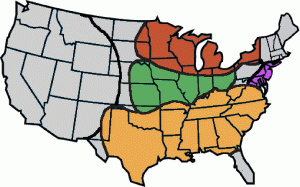Given the results of the cross-sectional studies, the ORDDR includes data from five tasks: dialect classification, locality ratings, social attitude ratings, cross-dialect intelligibility, and color naming. These five tasks can be completed in a single session by participants as young as 4 years old. Together, the ORDDR data allow us to explore the development of the critical cognitive, linguistic, and social components of dialect processing across the lifespan.
 To further ensure that our results are generalizable beyond our selected materials, the ORDDR is based on different materials than the cross-sectional studies, including a new set of utterances produced by a new set of talkers from four regional dialects of American English: Mid-Atlantic (purple), North (red), Midland (green), and South (yellow).
To further ensure that our results are generalizable beyond our selected materials, the ORDDR is based on different materials than the cross-sectional studies, including a new set of utterances produced by a new set of talkers from four regional dialects of American English: Mid-Atlantic (purple), North (red), Midland (green), and South (yellow).
Analyses of the ORDDR data reveal that the Southern dialect is the most perceptually distinct. Southern talkers were rated as less local, less friendly, and less smart than the other talkers, but were also more intelligible and easier to classify than the other talkers. As in the cross-sectional studies, the Northern talkers were rated as similarly local, friendly, and smart to the Midland talkers, but were much less intelligible, providing converging evidence that intelligibility differences between dialects can emerge in the absence of explicit social awareness of dialect differences.
The repository is available to the scholarly community and currently includes:
- all experimental files, including the stimulus materials and the experiments implemented in E-Prime and Powerpoint
- participant background information, including age and residential history
- all data files, including audio recordings of the color names and cross-dialect intelligibility (for children 4-11 years only) and data output from the four perception tasks (locality ratings, social attitude ratings, cross-dialect intelligibility, and dialect classification)
For access to the repository, please contact the PIs, Cynthia Clopper and Laura Wagner, to request access information.